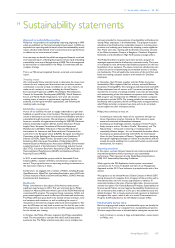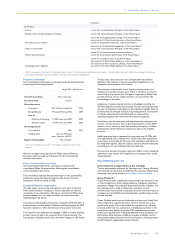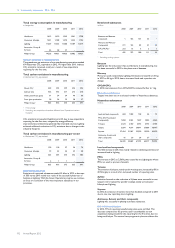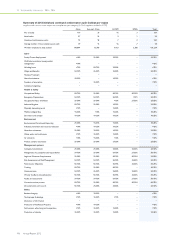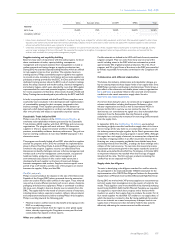Philips 2012 Annual Report Download - page 197
Download and view the complete annual report
Please find page 197 of the 2012 Philips annual report below. You can navigate through the pages in the report by either clicking on the pages listed below, or by using the keyword search tool below to find specific information within the annual report.
14 Sustainability statements 14.5 - 14.5
Annual Report 2012 197
China Asia excl. China LATAM EMEA Total
General
EICC Code 25-50% >75% 10-25% 25-50% 25-50%
Compliance with law − − − − −
1) Freely chosen employment: these cases are related to 1) workers having to pay a deposit for uniforms, safety equipment, and/or tools. We requested suppliers to return these
deposits to the workers and provide these items without demanding a deposit, and 2) in some cases no labor contract was signed. We requested suppliers to take corrective
actions and verified that contracts were in place for all workers.
2) Child labor avoidance/young worker management: this is related to one case of historic child labor, where a supplier hired 2 workers prior to reaching the legal age, but they
were no longer underage at the time of the audit. We requested the supplier to strengthen its management system and age verification procedure, and ensured that the
workers were enrolled in the young worker management program.
Supplier training and capability building
Based on many years of experience with the audit program, we know
that a combination of audits, capacity building, consequence
management and structural attention from management is crucial to
realize structural and lasting changes at supplier production sites.
During 2012 we extended capacity building initiatives which are offered
to help suppliers improve their practices. We organize classroom
training sessions, Philips sustainability experts regularly visit suppliers
to provide on-site consultancy and training, and we invite suppliers to
participate trainings provided by the EICC. In China and India we held
dedicated training sessions about the EICC code of conduct, trainings
about fire safety, electrical and machine safety, chemical management,
and industry hygiene, which were attended by more than 380 supplier
representatives for active and potential suppliers, including suppliers
for recent acquisitions. In Shenzhen, China we also hosted a Health and
Safety Training that was developed in joint effort by the EICC and GeSI.
In India, in a project initiated with the Dutch Ministry suppliers were
coached by local consultants in the development and implementation
of a sustainability strategy for their company, integrated in their
business strategy. Three suppliers participated in this bottom-up
approach, which helped suppliers to set their own objectives, based on
their own priorities and values as responsible corporate citizens.
Sustainable Trade Initiative IDH
Philips is one of the initiators of the IDH Electronics Program, an
innovative multi-stakeholder initiative sponsored by the Sustainable
Trade Initiative (IDH) together with Dell, HP, Philips and civil society
organizations. The program will work with over 100 electronics
suppliers in China to support innovative workforce management
practices, sustainability and better business performance. The goal is to
improve working conditions of more than 500,000 employees in the
electronics sector.
The program was formally kicked off end 2011 when the first suppliers
entered the program, and in 2012 we continued the implementation
phase in China’s Pearl River Delta. A total of 8 Philips suppliers are now
involved in the program. Suppliers receive a so-called Entry Point
Assessment to identify challenges common to factory management and
workers such as worker-management communication, occupational
health and safety, production, performance management and
environmental issues. Based on this a tailor made action plan is
developed with each supplier on the basis of improved dialogue
between management and workers. Suppliers receive support over a
period of up to 24 months, and the costs of the program are shared
between the supplier, Philips, and the IDH.
Conflict minerals
Philips is concerned about the situation in the east of the Democratic
Republic of the Congo (DRC) where proceeds from the extractives
sector are used to finance rebel conflicts in the region. These minerals
may end up in many different products such as cars, planes, chemicals,
packaging, and electronics equipment. Philips is committed to address
this issue, even though it does not directly source minerals from the
DRC. The supply chain for the metals of concern consists of many tiers,
including mines, traders, exporters, smelters, refiners, alloy producers
and component manufacturers, before reaching Philips’ direct suppliers.
Philips is working towards the following goals:
• Minimize trade in conflict minerals that benefit armed groups in the
DRC or an adjoining country
• Enable legitimate minerals from the region to enter global supply
chains, thereby supporting the Congolese economy and the local
communities that depend on these exports.
What are conflict minerals?
Conflict minerals are defined in the US Dodd-Frank Act as tin, tantalum,
tungsten and gold. They can come from many sources around the
world, including mines in the DRC which are estimated to provide
approximately 18% of global tantalum production, 4% of tin, 3% of
tungsten, and 2% of gold. Some of the mines in the DRC are controlled
by militias responsible for atrocities committed in the Congolese civil
war.
Collaboration with different stakeholders
We believe that industry collaboration and stakeholder dialogue are
key to creating impact at these deeper levels of our supply chain. Since
2008 Philips is actively contributing to the Extractives Work Group, a
joint effort of the electronic and mobile phone industry organizations
EICC and GeSI, to positively influence the social and environmental
conditions in the metals extractives supply chain. See also
http://www.eicc.info/extractives.htm.
As we have been doing for years, we continued our engagement with
relevant stakeholders including the European Parliament, other
industry organizations and local as well as international NGOs in
Europe and the US to see how we can resolve the issue. To
demonstrate our commitment we signed on to the multi-stakeholder
statement from the Responsible Sourcing Network, urging
stakeholders to continue the momentum on removing conflict minerals
from the supply chain.
In September 2012, the Conflict Free Tin Initiative was launched,
introducing a tightly controlled conflict-free supply chain of tin from a
mine in Congo all the way down to an end-product. Philips is one of
the industry partners brought together by the Dutch government that
initiated this conflict-free sourcing program in eastern DRC. Although
this region has a rich supply of minerals, its economy has collapsed due
to decades of ongoing conflict. In an effort to prevent minerals from
financing war, many companies worldwide have shielded away from
purchasing minerals from the DRC, creating a de facto embargo and a
collapse of the local economy. To overcome this issue and promote
cooperation and economic growth in the region outside the control of
the rebels, we launched the Conflict Free Tin initiative. In October 2012
an important milestone was reached when the first bags of tagged
minerals left the mine. The first end-user products containing this
conflict-free tin are expected mid 2013.
Supply chain due diligence
To assist in developing a due diligence standard for conflict minerals,
we participated in the multi-stakeholder OECD-hosted pilot for the
implementation of the ‘OECD Due Diligence Guidance for Responsible
Supply Chains of Minerals from Conflict-Affected and High-Risk Areas’.
During 2012 we worked with 347 priority suppliers to raise awareness
and start supply chain investigations into the country of origin for the
metals. These suppliers cover more than 80% of the relevant purchasing
spend. Using the EICC-GeSI Conflict Minerals Template we requested
our suppliers to report back their progress and to disclose which
smelters are used in their supply chains to produce the metals. For all
four metals together we identified 127 smelters in our supply chain, of
which the majority is located in Asia. By having published this smelter
list on our internet we created transparency at deeper levels in our
supply chain of those actors that we believe hold the key towards
effectively addressing the concerns around conflict minerals.


